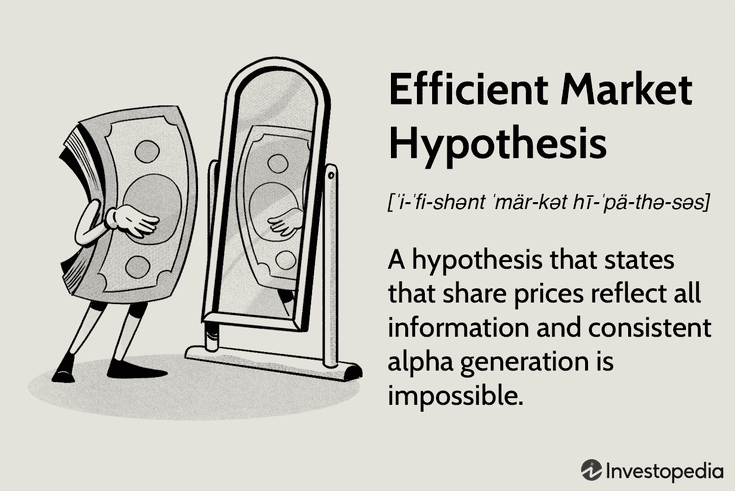Introduction
The essential premise of the efficient market hypothesis is that all information material to the pricing of stocks is widely disseminated and easily accessible. Price changes indicate the rapid incorporation of new information and data into the market due to the high volume of buyers and sellers. Therefore, according to the theory, share prices consistently reflect intrinsic worth. Suppose stocks always trade at their true worth, as proponents of the efficient market hypothesis claim. In that case, there is no way to consistently outperform the market, regardless of how much research is done or how carefully one attempts to time the market.
Three Variations Of the Efficient Market Hypothesis
Firm believers in the efficient market hypothesis (EMH) are more likely to choose passive investment strategies that attempt to mimic the performance of a benchmark, at least to some extent. There are essentially three ways to state the hypothesis:

The insufficiently developed version of the efficient market hypothesis
However, investors who subscribe to the weak variant of the efficient market hypothesis assume that prices may not reflect new information that has not yet been made public, in contrast to the former group. This is because those who believe in the efficient market hypothesis assume that the prices of securities already account for all relevant market data. It also assumes that new information will decide future prices rather than looking to the past for guidance. Technical analysis would be a waste of time if this were the case. The efficient market hypothesis in its weak form and a competent fundamental analyst can help you pick stocks with strong short-term performance potential. The ability of the fundamental analyst to predict the impact of new information on prices is the basis for this possibility.
In its semi-strong form, the efficient market hypothesis states that
Aside from restating the claims of the weak form, this version adds the concept that any newly released information is instantly included in market prices. When applied, neither fundamental nor technical analysis can produce excess returns.
The Efficient Market Hypothesis, in its Strong Form
It is the belief of those who subscribe to the strong form of the efficient market hypothesis that the price of an asset at any one time fully reflects all relevant information, whether public or private. In such a situation, a better rate of return cannot be assumed, even if investors have access to previously unavailable information.
Are There Markets That Are Inefficient Relative to Others?
The level of success enjoyed by active or passive management varies significantly from one fund to the next. In the United States, active real estate fund managers outperform their passive counterparts 75% of the time when all expenses are considered. High-yield bond funds under active management outperform those under passive management by 59.5% and diversified emerging market funds by 58.3%. Across the board, passive managers beat their active counterparts. Only 17.2% of the time did active managers in the US large-cap blend outperform passive managers after fees. These findings imply that not all markets are created equal.
Other Investment Strategies For Efficient Market Hypothesis
Belief in the efficient market theory calls into question the strategies employed by active traders and investors. If markets are efficient, paying top fund managers a high salary is a waste of resources for investment businesses.
Given the skyrocketing growth of assets managed by index and exchange-traded fund (ETF) funds, many investors may adhere to some of the ideas. However, technical analysis is often used by day traders. Value managers often use fundamental research to find cheap assets, and hundreds of value funds exist in the United States alone.
These are only two examples of investors who believe it can earn returns over the market average. It is up to individual investors to assess the data on both sides of the efficient market hypothesis and come to a judgment about the efficiency of the financial markets that best aligns with their beliefs about investing to make the maximum profit, given that there are so many professional investors on both sides of the hypothesis.

Conclusion
According to proponents of the efficient market hypothesis (EMH), stock prices should accurately reflect all relevant data. According to the EMH, stock prices on exchanges reflect a stock's actual value. Low-cost, passive portfolios are advantageous, according to EMH proponents. Stock prices may diverge from their actual values, which is why some people disagree with EMH and think it's feasible to beat the market.




